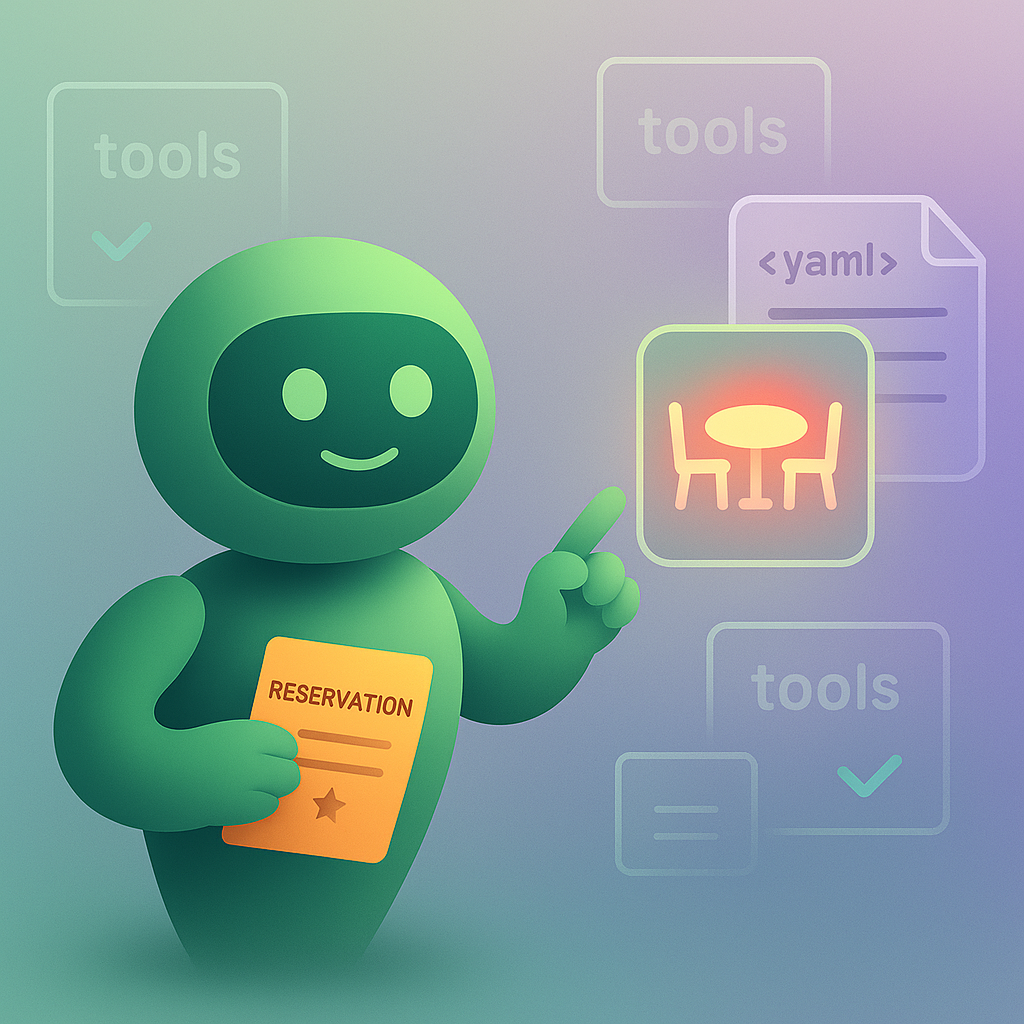
How to Integrate OpenTable With AI Agents Using a Custom OpenAPI Spec
OpenTable doesn’t offer a public OpenAPI spec, but that doesn’t mean it’s off-limits to AI agents. With Gentoro, developers can transform a custom-written OpenAPI YAML into fully functioning Model Context Protocol (MCP) Tools. These tools let agents like Claude or GPT-4 check availability, manage bookings, and pull guest data, all through natural language—and without having to hardwire each API interaction.
This post breaks down how the integration works, why it’s hard to do manually, and what Gentoro unlocks for teams building AI-powered reservation systems or any application that needs to interact with undocumented APIs.
Why Integrating OpenTable’s API Is Harder Than It Looks
At first glance, the OpenTable API seems accessible. The platform is widely used, and basic operations (like fetching availability or booking a table) are well understood. But beneath the surface, there’s one big catch: no public OpenAPI spec.
This lack of a machine-readable contract creates serious friction for AI integration. Developers are forced to reverse-engineer endpoints or rely on incomplete documentation, all while trying to manage authentication and complex data structures. And when things break, there’s no clear schema to trace errors back to.
Instead of focusing on agent design or user experience, teams often end up mired in:
- Interpreting undocumented endpoints through trial and error
- Writing fragile logic for nested request/response payloads
- Managing OAuth token flows without guidance
- Debugging unpredictable behavior from loosely defined inputs
It’s a messy process that’s too error-prone and time-consuming to scale, especially when all you want is for an AI agent to book a table or fetch a guest profile.
How Gentoro Helps Agentic Integration with OpenTable
Gentoro eliminates the overhead. It allows you to take a custom OpenAPI YAML (whether written by hand or derived from traffic inspection) and turn it into a set of fully operational MCP Tools.
Once uploaded, Gentoro parses the spec and generates callable tools that conform to the Model Context Protocol. These tools act as structured interfaces that AI agents can invoke reliably. The agent doesn’t need to understand the underlying API intricacies. It just calls get_reservation_status or cancel_booking, and Gentoro handles the rest.
What makes this especially powerful is the fidelity of the MCP Tools created by Gentoro. Each one includes:
- Descriptions optimized for natural language models
- Built-in support for secure authentication methods
- Clear input/output formatting that models can reason over
- Runtime scaffolding that ensures tools behave predictably across different agents
This takes what would normally be weeks of manual integration and compresses it into a repeatable workflow. It also means that once you’ve written or adapted your YAML, you don’t have to touch it again every time the API changes. You can just regenerate and redeploy.
Common Integration Pitfalls and How to Avoid Them
Even with Gentoro doing the heavy lifting, the quality of your integration still depends on the quality of your spec. If your OpenAPI YAML misses a parameter, misrepresents a data type, or skips authentication details, your generated tools might misbehave or silently fail.
These failures often show up as agents that misinterpret responses, send malformed requests, or hang during execution. That’s not a Gentoro problem… it’s a spec quality problem.
To get the most from this workflow, developers should:
- Lint their spec using tools like openapi-mcp
- Manually test each endpoint with real-world data
- Include realistic request/response examples to improve agent generalization
- Implement fallback logic for scenarios where APIs return partial or unexpected data
This level of diligence pays off. A clean, well-defined spec becomes a reusable contract, not just for Gentoro, but for any future tool generation or versioning.
Turning Any Custom API Into a Working Agent Interface
The OpenTable integration is more than just a clever hack. If you’ve ever faced an API that lacks documentation or an OpenAPI spec, Gentoro gives you a clear path forward. As long as you can define the endpoints and authentication logic in a YAML file, Gentoro can generate MCP Tools that integrate directly into your agent layer.
This opens the door to a new class of integrations. Whether you’re working with an internal microservice, a third-party platform with spotty docs, or a legacy system with no formal spec, the same process applies: write the spec, upload it, generate tools, and connect your agent.
And because Gentoro handles the runtime management, versioning, and security for you, you can move fast without compromising reliability.
Start Building Smarter AI Agents Today
This approach generalizes well beyond OpenTable. Even if you have to reverse-engineer it, as long as you can define endpoints, methods, and schemas in a valid OpenAPI 3.0 spec, you can generate MCP Tools that expose those operations to agents.
Gentoro handles the parsing, validation, and tool generation, producing callable interfaces with well-scoped inputs, OAuth support, and schema-aligned outputs. That reduces integration time, but more importantly, it reduces ambiguity at runtime. For any team building production-grade agent workflows that depend on third-party or internal APIs, this pattern offers a reliable way to operationalize agent access with clear interface boundaries and strong typing guarantees.
Watch the walkthrough video:
Request a demo or try the Gentoro Playground to vibe your own set of production-ready MCP Tools.
Customized Plans for Real Enterprise Needs
Gentoro makes it easier to operationalize AI across your enterprise. Get in touch to explore deployment options, scale requirements, and the right pricing model for your team.


